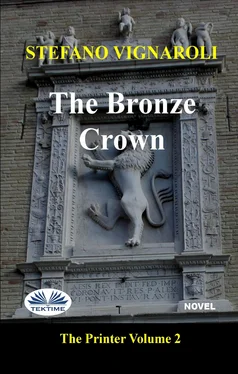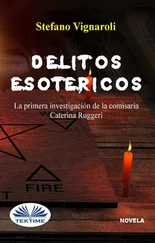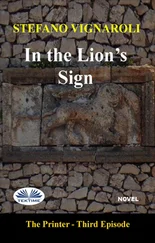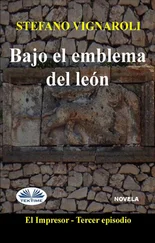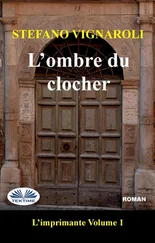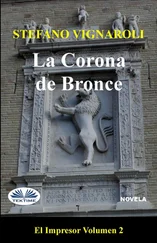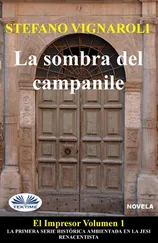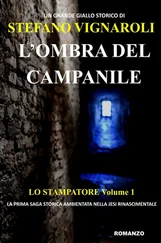For Duke Francesco Maria Della Rovere, expelling the Medici from Urbino and taking possession of his lands in Montefeltro was now a matter of principle, and the time had come. His father Giovanni Della Rovere, lord of Senigallia, had the architect and strategist Francesco di Giorgio Martini build a majestic fortress in Mondavio, practically halfway between Senigallia and Urbino. Francesco did not understand much about the strategic position of that sumptuous fortress, as it was entirely within their possessions, and not in a border position, where it would have been right to be. At that point they would never be attacked, and in fact the fortress had never been besieged since its construction had been completed, and almost thirty years had passed since that day. But the building was a majestic fortress and presented itself to the human eye as a frightening war machine, in which every shape and structure was designed to withstand the attacks launched both by traditional jet weapons, and by the most modern firearms, which were now becoming more and more widespread. The fortress itself was equipped with the deadliest known war machines: catapults, bombards and other deadly devils. In the armoury there were also so many rifles, pistols and arquebuses that they could arm a garrison of about a thousand armigers. The depot where the gunpowder was stored was well insulated and protected, and the keepers had hung on the walls an image of St. Barbara, to avoid, thanks to its protection, the danger of accidental bursts.
Therefore the Duke had chosen to move here, leaving the Rocca Roveresca of Senigallia, because Mondavio represented the ideal place from which to leave again to the conquest of Urbino. And he had to do so before the Malatesta arrived from Rimini or, worse, from Pesaro. The late spring of the year of the Lord 1522 was the right time to move his garrisons. Pope Leo X had died and had been replaced by Cardinal Adriano Florentz of Utrecht, who had taken the name of Adriano VI. He was a puppet, whose strings were pulled by the ecclesiastical oligarchy, and everyone was convinced that it would not last long before the Cardinal of Florence, Giulio De’ Medici, had planned something to regain the papal throne. So the moment had to be seized, anticipating the moves of both the Malatesta and the Medici. But he considered his lieutenant, Orazio Baglioni, incapable. And even if he wasn’t strategically and militarily incapable, he still considered him a Malatesta spy. Only a few months earlier, in December, Francesco was allied with the Malatesta, and together with him had driven the papal legions out of Fabriano and Camerino, restoring the power of the Dukes of Varano, and then heading with the militia united towards Perugia. They had stopped at the news of the death of Pope Leo X, returning to their territories of Senigallia and Pesaro respectively. Officially, Francesco Maria Della Rovere was still allied with the Malatesta, and proof of this was that lieutenant who continued to have him under his feet. It was necessary to eliminate him and take a valid substitute in his place, if he wanted to enter Urbino quickly, mocking his old ally. Only one name was on his mind, that of Andrea Franciolini. He had taken information about him, at the time when he had attacked the city of Jesi, some years before. The mercenaries in his pay had reduced him to dying, but he got away with it. He hadn’t really understood how he had escaped the death sentence hanging over his head, perhaps with the help of the Duke of Montacuto, at least that’s what people said. Franciolini was young, but he had a reputation for being good, both as a leader and a fighter. But at the moment it seemed that he had been detained, for some years now, at the court of Duke Berengario of Montacuto. Thanks to some spies he had at the castle of Massignano, two young servants of Senigallian origin, he had finally obtained the information he needed.
«The Montacuto has agreed with the Malatesta to send young Franciolini to his service. On the 22nd of May, Andrea Franciolini, with an escort man, will pass through the parts of Senigallia, to reach the Malatesta in Pesaro and join his army», the young cook Giuliano had told him, one day he had returned to Senigallia with the excuse of visiting his mother. «But he will never get there because it is a trap. In fact, the Duke of Montacuto has already made arrangements in secret with the new Pope to “sell” the Marca Anconitana to the Papal States for a few thousand gold florins. And so now Franciolini is an inconvenient character. He’ll have him killed by two assassins at the Tower of Montignano. It doesn’t matter at this point if the one who has so far considered his right-hand man, Gesualdo, known as The Mancino, will also be involved. The Duke of Montacuto needs money, a lot of money, he is indebted to the bone to build a huge and useless fortification to defend the port of Ancona. And he can no longer justify his expenses to the Council of Elders. So...»
«I get it», said Della Rovere, slipping some silver coins into the boy’s hands. «So he decided to sell the city, fortress, port and territories to the highest bidder, eliminating the inconvenient characters. I believe that any day now they will find all the members of the Council of Elders of the city of Ancona dead. Who knows, perhaps an epidemic, as sudden as it is providential!»
The same evening, Duke Francesco Maria Della Rovere returned to Mondavio. The next morning, the servants of Orazio Baglioni found the lieutenant lying on his bed with his eyes barred and the foam coming out of his lips. On the cabinet beside the bed was found a glass still containing residues of poisoned liquid.
«He killed himself», the Duke said as soon as he was told the news. «He confided to me a few days ago that he was suffering from love pains. He was in love, but the bridesmaid who was the object of his desires had twice refused him. Pity, he was a good soldier. Now I’ll have to find a worthy replacement.»
The spring day was already heralding the arrival of a hot summer, and Francesco Maria wore a light yellow doublet and comfortable stockings. He was thirty-two years old at the time, but he proved to be much older. He was a man not very tall, but robust, his physique tempered by the countless battles, always fought on the field. Even as a warlord, he had never backed down in front of the towel. And the enemies he had killed were no longer even counted. The long dark beard, the ruffled hair and the squinting of the Montefeltro family, inherited from his mother’s side, made him a treacherous man, who was fearful of anyone who came before him. It was uncommon for him to wear light clothes like that day. Often, even in his apartments, he wore studded jackets and reinforced stockings. And he never abandoned his sword, always placed in its sheath on his right side. For political reasons, he had married very young, only fifteen years old, to the beautiful Eleonora Gonzaga, with whom he had had a son, Guidobaldo, who was now eight years old. Wife and son were far from him and his battlefields, and enjoyed the luxury and comfort of the court of Mantua. But when Urbino was under his power again, he would see to it that Eleonora and Guidobaldo joined him at the Ducal Palace of Urbino, which was no less beautiful than the Gonzaga castle. And the fact of having Eleonora again beside him, would have allowed him to start thinking about some other children. Of course, his descendants were assured, but a gentleman who respects himself must have a host of children, to be shown in public and to be directed, at the appropriate time, to hold important positions of power, worthy of the name they would bear.
Thinking of his faraway wife had tickled his desires and instincts from too much repressed, and he already felt his own sex rising. But how could he satisfy in that place instincts that emerged in all their power?
Читать дальше
